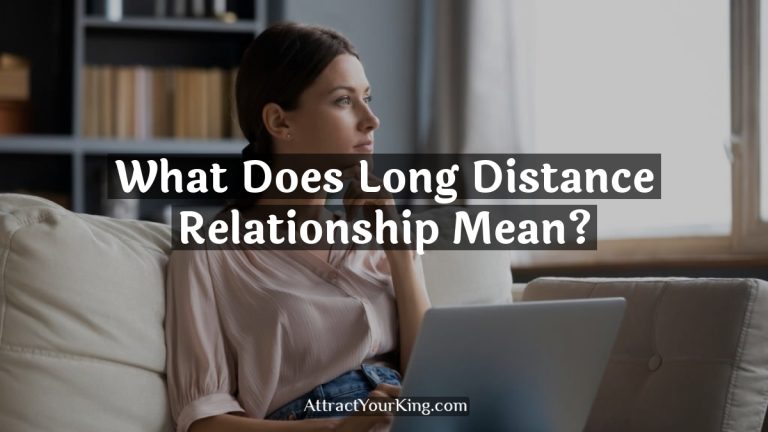Do I Love Him Or Am I Just Attached?
As an experienced relationship blogger, I’ve come to realize that one of the most difficult questions we face in our romantic journey is, “Do I truly love him or am I just attached?”. It’s a delicate line to walk, where our feelings are seemingly indistinguishable.
In today’s post, I’m going to help shed some light on this challenging question by discussing the difference between love and attachment. We will dive into recognizing the telltale signs of each and how to better understand the origin of these emotions.
Identifying Your Feelings
It can be tricky to figure out if we’re in love or just attached to someone. Love and attachment are two different things. Understanding the difference between them can help you with your relationship. This article talks about the distinction between love and attachment, so you know your feelings.
Define what love means to you
Love is a hugely intricate emotion. It is said to be the most powerful link between two people. It has various meanings for everyone.
To me, it is the bond between two people and can draw out the greatest and worst of humanity. It is acceptance without conditions, respect, admiration, and selflessness without expectations or criticism.
It can be strong and mild, serene yet enthusiastic, dependable yet inquiring.
Above all, it goes past all age, gender, and racial barriers; love doesn’t receive labels or limitations – it simply is what it is, and should be given without thought.
Assess if your feelings are based on attachment
When something stirs emotions inside us, it’s essential to think if they come from attachment. Attachment is the amount of our bond with people and stuff, from insignificant to strong feelings. Knowing our attachment rate in certain cases can help us understand why we feel the way we do.
We might be attached to certain people for a variety of causes. For instance, fear of being left alone or missing them when not around. We can also be attached to physical items that make us remember memories or shape our identity. In contrast, feeling detached from something can lead to disappointment or anger if it once mattered in our life.
Checking if our emotions depend on attachment can help us comprehend why we feel that way and acknowledge what type of relationship binds us to the person or thing. Considering the force and meaning behind the feeling will give us clarity on how to go on in any circumstance by helping us analyze our relations and objectives.
Understanding Attachment
Attachment is a link we have with others that can hugely impact our emotions and actions. It is a key factor in romantic relationships and understanding it better can help us build healthier ones. This article will explore what attachment and love are, and how to know which one you are feeling.
Understand the difference between love and attachment
Love is built on care, intimacy, trust, and acceptance. Giving and taking should be equal. If it’s one-sided and you feel your partner owes you—this is attachment, not love. The attachment has its roots in insecurity, co-dependence, and neediness. It can come from childhood experiences where a person only felt loved if they met their parent’s expectations.
In adult relationships, if you need your partner around all the time to feel secure or loved, this could be an unhealthy attachment. People need independence to be healthy and depending on another person can harm the relationship and hurt you.
Signs of unhealthy attachment include:
- relying on the relationship for happiness;
- feeling possessive or jealous when your partner talks to other people;
- feeling hurt or angry when they disagree;
- responding to frustration with aggression;
- needing approval from your partner;
- making decisions based on what will make them happy;
- never thinking about breaking up;
- trying to change their desires to match yours;
- disregarding good moments to fit certain agendas.
In summary: Love is mutual respect and compromise, while attachment is meeting one’s own emotional needs through another person, instead of taking responsibility for wellbeing.
Learn to recognize the signs of attachment
A healthy attachment starts with initial care. It’s seen with a strong emotional connection between the caregiver and the kid. This is shown by expressing emotion, connecting, transferring positive energy, understanding kids’ needs, and providing consistent support. With good attachment, a child can develop social skills as they feel safe and trust others.
We can spot secure or insecure attachments from certain behaviors. Insecure attachment can lead to social troubles such as anger outbursts, fear of strangers, or difficulty showing affection with peers. Knowing the signs of secure and insecure attachment helps parents handle any issues their child may have in the early years.
Secure Attachment Signs:
- A positive reaction when parent arrives
- Exploring when close to parent/caregiver
- Shows emotions like joy or interest when parent is around
- Uses common tasks as chances for communication
- Looks for comfort from primary caregiver during tough activities
- Responds well to hugs and other physical affection from caregivers/parenting figures
Insecure Attachment Signs:
- Frequent crying and clinging to parenting figures/caregivers
- When parent leaves, seeks comfort from strangers
- Difficulty calming down without help from primary caregiver
- Trouble forming relationships with people other than parents
- Avoids eye contact or touching with parenting figures/caregivers
Examining Your Relationship
Relationships – hard to tell love from attachment? Step back, and reflect. What does it mean to love someone? How to distinguish? This article looks at the difference between love and attachment, and how to figure out which is which.
Examine if your relationship is healthy
To assess the health of your relationship, ask yourself crucial questions to determine if anything needs to be changed. Think about the following points and decide what you could do to make the relationship more beneficial and healthy.
- Respect: Do you and your partner show respect for each other? Respect is an integral part of any sturdy relationship, as it shows true admiration for one another’s values, wishes and opinions.
- Trust: Can you depend on each other? If you have difficulty trusting your partner, this can lead to increased stress, lack of security and dejection in the relationship.
- Commitment: How devoted are you both to making a strong bond? Mutual commitment is necessary in any long-term relationship – without the dedication from both people, it will be hard to sustain a healthy relationship.
- Openness: Is your communication open and sincere? Being able to be transparent is essential for two people in a romantic partnership to form a deep level of understanding – they should be able to express themselves without fear of judgement or criticism in a healthy relationship.
- Compatibility: Are there any areas that cause tension between you? Being able to recognize patterns of behavior where differences come up can help lessen strain during difficult conversations by dealing with issues directly before they start negatively affecting the connection between the two.
Identify if your relationship is based on mutual respect
Mutual respect is key to a healthy and meaningful relationship. Respect for one another’s individual needs, ideals and boundaries, builds a stronger and happier bond. Respect doesn’t mean both parties must agree all the time. It means they value each other and seek compromise when needed.
Here are ways to tell if your relationship has mutual respect:
- Expressing appreciation of each other’s thoughts and opinions
- Giving space and freedom while also doing things together
- Having honest conversations about past mistakes and grievances, while respecting each other’s feelings
- Being honest about their hopes for the future
- Making choices that honor both parties with fairness and kindness
- Sharing responsibilities and leisure activities
- Enjoying spending time together without enforcing expectations
Understanding Your Emotions
Are you perplexed, not sure if it’s love or attachment? It’s tough to tell the two apart. Knowing your emotions are paramount for making clear decisions and deciding how to go on with a relationship.
In this article, let’s discuss the differences between love and attachment, and how to determine what you are feeling:
Learn to recognize and understand your emotions
Having an understanding of your emotions can lead to a happier life. Knowing your feelings and why they exist can help with communication. It’s important to learn how to respond to your feelings in the right way, which can help maintain good relationships.
- Start by learning to identify emotions. Everyone experiences happiness, sadness, fear, anger, and surprise, but some emotions are more complex. You can figure out these specific feelings with practice.
- Understand why certain situations cause certain emotions. Analyzing behavior-emotion connections can help you in future difficult times.
- Once you know your own emotions and how to respond to them, create healthy boundaries for yourself and others. This will help you adapt quickly in stressful moments.
Acknowledge and accept your feelings
Feelings are a part of life. Recognizing and accepting them is key. Acknowledging your emotions is important for understanding yourself and managing them. Give your feelings the attention they deserve. Realize that feelings don’t define you, they are just expressions of who you are.
We all experience a range of emotions. Don’t be ashamed or embarrassed by them. Accepting the emotion helps us be more objective. We can challenge our beliefs and rethink our patterns so we can live a fulfilled life. It will help us react better when faced with tricky situations.
Moving Forward
Is true love real? Some may be confused. Consider your feelings. Take time to think it through. Let’s explore what it means to move forward. How can we tell if it’s love or just attachment? It’s worth exploring.
Identify if your relationship is worth pursuing
Deciding if a relationship should continue or end is critical. Moving without assessing can lead to hurt. Taking the time to honestly assess how you feel is essential for respect.
Identify any issues causing discord. Consider negative interactions, toxicity and lack of effort. Assess the potential for growth and work together constructively. Assess if the relationship is worth pursuing– do values and goals align? Self-reflect – identify what you need from relationships and why you enter into them. Figure out which partnerships are worth developing and which aren’t suitable for well-being.
Take the necessary steps to move forward in your relationship
Taking action in a relationship brings many perks, such as trust, better communication, and understanding. Relationships are always changing, so proactive steps are needed to keep them healthy and intimate. Here are tips for a healthier relationship:
- Appreciate your partner: Show your gratitude for their love and support. Appreciation is a must.
- Communicate: Talk about your needs, feelings, and fears without interruption or criticism. Listen before responding.
- Quality time: Set aside time for activities like dinner or classes that build connections.
- Empathize: Try to understand your partner’s perspective when solving problems. That shows respect.
- Play together: Have fun with interactive games or puzzles. They foster closeness and build problem-solving skills.
- Set goals: Discuss what you both want to achieve in the relationship. Then make plans to reach those goals.
Conclusion
With this knowledge in hand, you’ll be empowered to navigate your emotions and gain clarity. Determining whether your feelings stem from deep love or something less meaningful will pave the way for healthier and more fulfilling relationships.
As you embark on this journey of self-discovery, remember that recognizing and understanding your emotions is a critical step towards authentic love. Always listen to your heart and intuition, as they will guide you toward a relationship that truly fills your soul with happiness.







